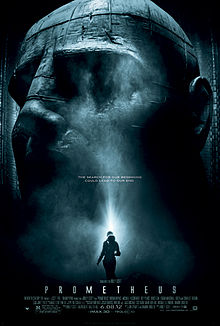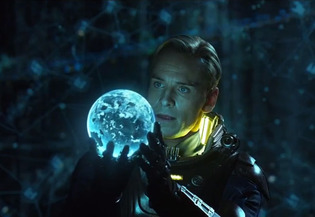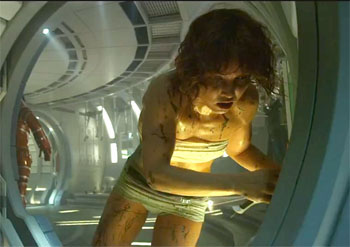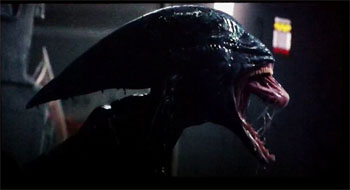 Prometheus (2012, Dir. Ridley Scott):
Prometheus (2012, Dir. Ridley Scott):
If the road to Hell is paved with good intentions, then the opening images of Ridley Scott’s Prometheus are a yellow brick highway: majestic vistas of unknown primordial lands (aka Iceland), the shadow of an alien craft looming over a waterfall to end all waterfalls, an extraterrestrial with translucent skin and rabbit eyes ingesting a potion that literally breaks him into component DNA, the strands reconstituting themselves as… well, what? There’s the attraction and the rub: from the start it’s clear Prometheus has a lot on its mind, maybe too much. In space, no one can hear you pontificate.
It’s easy to roll your eyes at those first five minutes: we’ve got pretension (ladies and gentlemen, the beginning of the world!), showy effects (right down to the CGI DNA), and a half-baked mystery (whence the alien and his potion, wherefore his self-sacrifice, and what is the result of this cosmic seeding?). And before we’re done with the movie, we’ve got references to 2001, Blade Runner and Lawrence of Arabia, enough Jesus parallels to fill a Bible, Stephen Stills’ squeeze box, a sweaty Charlize Theron in an outer-space bra, and oh yes, icky aliens.
So yes, Prometheus is a mongrel mishmash of genres and impulses. And yet it’s impossible to simply dismiss it, for we know that Scott directed Alien (1979), a nasty little miracle of a film that also combined unlikely elements like a mad scientist on a bender. You had a cast of bickering truckers in space, played by consummate character actors, talking over and at each other like an Altman movie; a design aesthetic equally influenced by Star Wars and 2001; and most unforgettably, the alien itself, a psychosexual monster conjured up by H.R. Giger, as poetic and to-the-point as your worst nightmare. Pulled together by Scott’s eye for setting and atmosphere, and then let loose by a script that is still a lesson in how to ratchet up tension, Alien has been oft-imitated, even by its own sequels, but none of its progeny has quite equaled the original’s sense of dread, the feeling that everything, including ourselves, is not safe — for who is safe when an alien could burst from your chest at any moment, or your crewmate reveals himself as an android and literally loses his head?
 Prometheus, while it fills in some of the mythology surrounding Alien, has more highfalutin ambitions, like pondering the origins of humankind, immortality, and whether androids dream of electric sheep. For the first half we’re happily along for the ride, as a ragtag team of scientists, corporate execs and grizzled crewmembers aboard the space vessel Prometheus (named after the bringer of fire, we’re helpfully reminded, just in case you didn’t get the symbolism) investigates a planet that may hold the key to life, the universe and everything. Scott’s ability to spin a yarn hasn’t deserted him, and the best moments have a matter-of-fact grandeur: the “artificial person” David (Michael Fassbender steals the show at every turn with peevish wit, as if he can barely put up with these uncouth humans) puttering about the ship whilst the crew is in cryostasis, adopting Peter O’Toole’s Colonel Lawrence mannerisms via vidcasts while “listening” in on the crew’s dreams; or a long shot of the Prometheus burning through the atmosphere of a forbidding world, leaving behind a delicate trail of exhaust. As the survey team led by doctors Elizabeth Shaw (Noomi Rapace) and Charlie Holloway (Logan Marshall-Green) enters a dark, muggy alien dome in search of what might be their makers — and we expect a few of them will actually meet their makers — we sit up straight in our seats.
Prometheus, while it fills in some of the mythology surrounding Alien, has more highfalutin ambitions, like pondering the origins of humankind, immortality, and whether androids dream of electric sheep. For the first half we’re happily along for the ride, as a ragtag team of scientists, corporate execs and grizzled crewmembers aboard the space vessel Prometheus (named after the bringer of fire, we’re helpfully reminded, just in case you didn’t get the symbolism) investigates a planet that may hold the key to life, the universe and everything. Scott’s ability to spin a yarn hasn’t deserted him, and the best moments have a matter-of-fact grandeur: the “artificial person” David (Michael Fassbender steals the show at every turn with peevish wit, as if he can barely put up with these uncouth humans) puttering about the ship whilst the crew is in cryostasis, adopting Peter O’Toole’s Colonel Lawrence mannerisms via vidcasts while “listening” in on the crew’s dreams; or a long shot of the Prometheus burning through the atmosphere of a forbidding world, leaving behind a delicate trail of exhaust. As the survey team led by doctors Elizabeth Shaw (Noomi Rapace) and Charlie Holloway (Logan Marshall-Green) enters a dark, muggy alien dome in search of what might be their makers — and we expect a few of them will actually meet their makers — we sit up straight in our seats.
And that underlines Prometheus‘ central problem: it wants to be a sober examination of sci-fi ideas that have rattled around in our collective heads at least since the days of Ray Bradbury and Amazing Stories, and yet it’s also obligated to follow Alien‘s thriller-chiller mechanics. In this case, the machinery is rickety — most of the crew struggle to gain one dimension, all the better for scenes in which any kind of reasonable human behavior is abandoned, like teasing an alien worm that could very easily break your arm and slither down your throat. Playing the corporate bitch, Theron is burdened with muddled motivations and hidden secrets that don’t lead to a single payoff; likewise, Guy Pearce, buried in old age makeup as the head of Weyland Corporation, gets a comeuppance which is more of a shrug than a punch. The only lively human in this assembly is Idris Elba’s salt-of-the-earth space captain, and even he amounts to just a smattering of tics (i.e., the Stephen Stills squeezebox).
 One can argue that this is part of Scott’s master plan, that there is a certain irony in the fact that mankind’s representatives on this historic mission are a bunch of misfits, opportunists and idiots, but it still doesn’t explain the lazy plotting that afflicts the second half of the movie, wherein a geologist with a GPS map gets lost, a live alien is extracted and conveniently forgotten about until a climactic moment twenty minutes later, and a salt-of-the-earth space captain divines the aliens’ true purpose out of the blue. Damon Lindelof, one of the prime writers behind Lost, handles the screenwriting duties here, and it’s clear that his head is still in television: there’s about two seasons’ worth of enigmas and shell games to untangle here, way too many to resolve by film’s end (yes, we can hear the word “sequel” too). It’s disheartening to think that with the millions spent on this film, you’ll find a superior mixture of big ideas, sci-fi action and character work in any above-average episode of the original Star Trek.
One can argue that this is part of Scott’s master plan, that there is a certain irony in the fact that mankind’s representatives on this historic mission are a bunch of misfits, opportunists and idiots, but it still doesn’t explain the lazy plotting that afflicts the second half of the movie, wherein a geologist with a GPS map gets lost, a live alien is extracted and conveniently forgotten about until a climactic moment twenty minutes later, and a salt-of-the-earth space captain divines the aliens’ true purpose out of the blue. Damon Lindelof, one of the prime writers behind Lost, handles the screenwriting duties here, and it’s clear that his head is still in television: there’s about two seasons’ worth of enigmas and shell games to untangle here, way too many to resolve by film’s end (yes, we can hear the word “sequel” too). It’s disheartening to think that with the millions spent on this film, you’ll find a superior mixture of big ideas, sci-fi action and character work in any above-average episode of the original Star Trek.
 More quixotic than adventurous, Prometheus nevertheless has isolated moments of bonkers conviction. The earnest, curious and very God-fearing Shaw is the nominal hero, and while Rapace won’t make anyone forget Sigourney Weaver, she does get the best scene in the film, a perverted Virgin Mary moment in which she has to perform an emergency abortion on herself (the film calls it a “caesarian,” but let’s call a spade a spade). A nauseating varation on Alien‘s chestburster scene, you can feel Scott firing on all cylinders here, reveling in his sci-fi toys even as they slice open Shaw’s stomach, the audience caught up in pure visceral reaction. Sadly that thrill is an island in a sea of increasingly glossy, empty gestures. Scott now has the wherewithal to play around with gargantuan sets and 3D effects, and he’s too much of a craftsman not to leave you in awe, but the fussiness on display overwhelms the recognizably human qualities that informed Alien — the claustrophobia, grit, and simple through-line (kill the damn alien before it kills you). By movie’s end, all thoughts of a brainy sci-flick have been lost in a storm of crashing ships and effects overload. The original alien, or rather its progenitor, does makes a cameo when all’s said and done, and the moment is an oh-by-the-way, a sad reminder of days when spirits were higher, and the flesh very much creepier and crawlier. Long live the old flesh.
More quixotic than adventurous, Prometheus nevertheless has isolated moments of bonkers conviction. The earnest, curious and very God-fearing Shaw is the nominal hero, and while Rapace won’t make anyone forget Sigourney Weaver, she does get the best scene in the film, a perverted Virgin Mary moment in which she has to perform an emergency abortion on herself (the film calls it a “caesarian,” but let’s call a spade a spade). A nauseating varation on Alien‘s chestburster scene, you can feel Scott firing on all cylinders here, reveling in his sci-fi toys even as they slice open Shaw’s stomach, the audience caught up in pure visceral reaction. Sadly that thrill is an island in a sea of increasingly glossy, empty gestures. Scott now has the wherewithal to play around with gargantuan sets and 3D effects, and he’s too much of a craftsman not to leave you in awe, but the fussiness on display overwhelms the recognizably human qualities that informed Alien — the claustrophobia, grit, and simple through-line (kill the damn alien before it kills you). By movie’s end, all thoughts of a brainy sci-flick have been lost in a storm of crashing ships and effects overload. The original alien, or rather its progenitor, does makes a cameo when all’s said and done, and the moment is an oh-by-the-way, a sad reminder of days when spirits were higher, and the flesh very much creepier and crawlier. Long live the old flesh.

